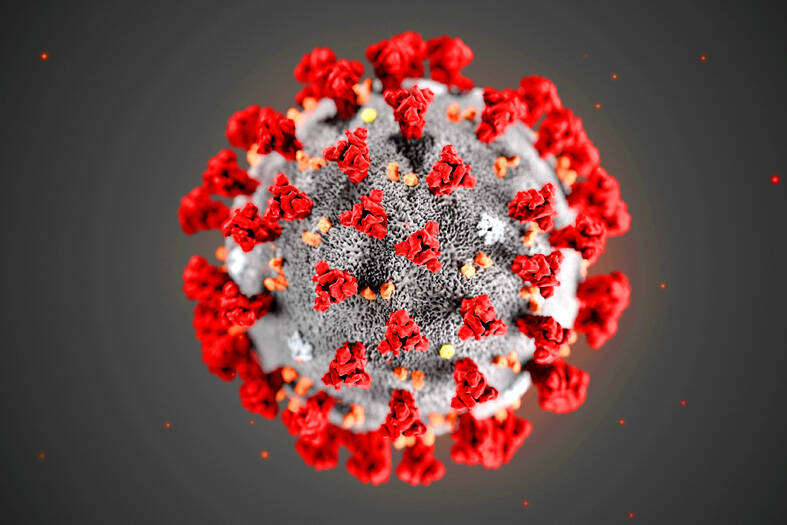New COVID-19 variants could emerge to replace Omicron, the most recent major variant, and the key to stopping them spreading is to pay attention to the treatment of mild cases, an evolutionary biologist said yesterday.
Wu Chung-i (吳仲義), an academician at Academia Sinica who researches evolutionary genomics, gave the warning in a speech to the general assembly of the Taiwan Association for Promoting Public Health.
Taiwan downgraded COVID-19 to a less serious communicable disease and ended most prevention measures on May 1.

Photo: Alissa Eckert, MS; Dan Higgins, MAM / US Centers for Disease Control and Prevention / Handout via Reuters
Calling for COVID-19 to be treated as an endemic illness such as the flu is irresponsible, because while seasonal flu viruses often undergo antigenic drift — a minor change to a flu virus — SARS-CoV-2, the virus that causes COVID-19, continues to spread and evolve, creating new strains that could behave differently to the original virus, Wu said.
Since COVID-19 was declared a global pandemic in 2020, SARS-CoV-2 variants such as Alpha, Delta and Omicron have emerged.
After the first wave of infections in around late 2021, subsequent Omicron waves were smaller, giving hope that the pandemic would end, Wu said, adding that this came about because the high transmission rate combined with very mild pathogenicity of the Omicron variant helped build herd immunity.
However, the emergence of new variants could trigger the resurgence of the COVID-19 pandemic, Wu said.
“When the previous mainstream virus strain existed, no one expected another virus strain to rise,” he said.
For instance, whole-genome sequencing of the Delta strain first appeared in the US and Europe in March 2020, but it was latent for a period before becoming the main global variant from June to November 2021, replacing Alpha, Wu said.
Since the government downgraded the status of COVID-19, most medical resources have been allocated and efforts focused on diagnosing and treating moderate and severe cases of the virus, he said.
However, to stop the spread of viruses, medical and health providers should focus on treating asymptomatic and mildly symptomatic cases to break the chain of infection, he said.
Even if COVID-19 does not make a comeback, the probability of a new coronavirus pandemic that would have a similar impact to COVID-19 cannot be ruled out in the next seven to eight years, Wu said.

ENTERTAINERS IN CHINA: Taiwanese generally back the government being firm on infiltration and ‘united front’ work,’ the Asia-Pacific Elite Interchange Association said Most people support the government probing Taiwanese entertainers for allegedly “amplifying” the Chinese Communist Party’s propaganda, a survey conducted by the Asia-Pacific Elite Interchange Association showed on Friday. Public support stood at 56.4 percent for action by the Mainland Affairs Council and the Ministry of Culture to enhance scrutiny on Taiwanese performers and artists who have developed careers in China while allegedly adhering to the narrative of Beijing’s propaganda that denigrates or harms Taiwanese sovereignty, the poll showed. Thirty-three percent did not support the action, it showed. The poll showed that 51.5 percent of respondents supported the government’s investigation into Taiwanese who have

South Korean K-pop girl group Blackpink are to make Kaohsiung the first stop on their Asia tour when they perform at Kaohsiung National Stadium on Oct. 18 and 19, the event organizer said yesterday. The upcoming performances will also make Blackpink the first girl group ever to perform twice at the stadium. It will be the group’s third visit to Taiwan to stage a concert. The last time Blackpink held a concert in the city was in March 2023. Their first concert in Taiwan was on March 3, 2019, at NTSU Arena (Linkou Arena). The group’s 2022-2023 “Born Pink” tour set a

A Philippine official has denied allegations of mistreatment of crew members during Philippine authorities’ boarding of a Taiwanese fishing vessel on Monday. Philippine Bureau of Fisheries and Aquatic Resources (BFAR) spokesman Nazario Briguera on Friday said that BFAR law enforcement officers “observed the proper boarding protocols” when they boarded the Taiwanese vessel Sheng Yu Feng (昇漁豐號) and towed it to Basco Port in the Philippines. Briguera’s comments came a day after the Taiwanese captain of the Sheng Yu Feng, Chen Tsung-tun (陳宗頓), held a news conference in Pingtung County and accused the Philippine authorities of mistreatment during the boarding of

88.2 PERCENT INCREASE: The variants driving the current outbreak are not causing more severe symptoms, but are ‘more contagious’ than previous variants, an expert said Number of COVID-19 cases in the nation is surging, with the Centers for Disease Control (CDC) describing the ongoing wave of infections as “rapid and intense,” and projecting that the outbreak would continue through the end of July. A total of 19,097 outpatient and emergency visits related to COVID-19 were reported from May 11 to Saturday last week, an 88.2 percent increase from the previous week’s 10,149 visits, CDC data showed. The nearly 90 percent surge in case numbers also marks the sixth consecutive weekly increase, although the total remains below the 23,778 recorded during the same period last year,